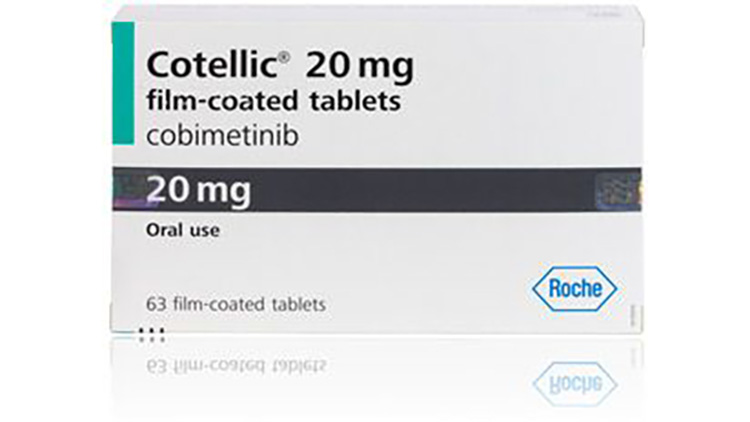Keytruda (pembrolizumab) vs Cotellic (cobimetinib)
Keytruda (pembrolizumab) vs Cotellic (cobimetinib)
Keytruda (pembrolizumab) is an immune checkpoint inhibitor that works by blocking the PD-1 protein on cells, which can help the immune system to detect and fight cancer cells, and is commonly used to treat various types of cancer, including melanoma, non-small cell lung cancer, and head and neck cancer. Cotellic (cobimetinib), on the other hand, is a MEK inhibitor that works by interfering with the MEK proteins involved in cell division and can be used in combination with other drugs to treat advanced melanoma with a specific type of genetic mutation known as BRAF V600E or V600K. The choice between Keytruda and Cotellic would largely depend on the specific type of cancer, its genetic makeup, and the overall treatment plan determined by a healthcare provider.
Difference between Keytruda and Cotellic
| Metric | Keytruda (pembrolizumab) | Cotellic (cobimetinib) |
|---|---|---|
| Generic name | Pembrolizumab | Cobimetinib |
| Indications | Various types of cancers including melanoma, lung cancer, head and neck cancer, Hodgkin lymphoma, and stomach cancer | Advanced melanoma in combination with vemurafenib in patients with a BRAF V600 mutation |
| Mechanism of action | Programmed death receptor-1 (PD-1) blocking antibody | MEK inhibitor, which works by inhibiting mitogen-activated protein kinase enzymes MEK1 and MEK2 |
| Brand names | Keytruda | Cotellic |
| Administrative route | Intravenous infusion | Oral |
| Side effects | Fatigue, cough, nausea, itching, skin rash, decreased appetite, constipation, joint pain, and diarrhea | Diarrhea, sunburn or sun sensitivity, liver problems, rashes, and muscle pain |
| Contraindications | None known specifically, but should be used with caution in patients with autoimmune diseases or those receiving immunosuppressive medications | None known specifically, but should be used with caution in patients with cardiac dysfunction, retinal pathologies, or liver impairment |
| Drug class | Anti-PD-1 monoclonal antibody | MEK inhibitor |
| Manufacturer | Merck & Co. | Genentech (a member of the Roche Group) |
Efficacy
Keytruda (pembrolizumab) Efficacy in Skin Cancer
Keytruda, also known as pembrolizumab, is an immunotherapy drug that has shown significant efficacy in treating skin cancer, particularly advanced melanoma, which is the most serious type of skin cancer. As a programmed death receptor-1 (PD-1) blocking antibody, Keytruda works by enhancing the body's immune system to help detect and fight cancer cells. Clinical trials have demonstrated that pembrolizumab can lead to durable responses and prolonged survival in patients with advanced melanoma. The drug has been approved by regulatory agencies, including the U.S. Food and Drug Administration (FDA), for the treatment of patients with unresectable or metastatic melanoma.
In several clinical studies, Keytruda has been shown to improve overall survival and progression-free survival compared to other treatments. For example, in the KEYNOTE-006 study, pembrolizumab was found to provide superior overall survival and progression-free survival rates compared to ipilimumab in patients with advanced melanoma. Additionally, Keytruda has been associated with a higher percentage of complete or partial tumor responses, indicating a reduction in tumor size or complete disappearance of the tumor in some patients.
Cotellic (cobimetinib) Efficacy in Skin Cancer
Cotellic, known generically as cobimetinib, is another medication used in the treatment of advanced melanoma, particularly for patients with a specific type of genetic mutation known as BRAF V600E or V600K mutation. Cobimetinib is a MEK inhibitor that works by blocking certain proteins (MEK1 and MEK2) involved in the growth and spread of cancer cells. When combined with another medication called vemurafenib, a BRAF inhibitor, cobimetinib has been shown to improve outcomes in patients with this mutation-positive advanced melanoma.
The efficacy of Cotellic in combination with vemurafenib was demonstrated in a pivotal phase III clinical trial (coBRIM study), where the combination significantly extended progression-free survival compared to vemurafenib alone. The study also indicated improvements in overall survival and response rate. The combination of cobimetinib and vemurafenib was approved by the FDA for the treatment of patients with BRAF V600E or V600K mutation-positive unresectable or metastatic melanoma based on these results.
Regulatory Agency Approvals
Keytruda
-
European Medical Agency (EMA), European Union

-
Food and Drug Administration (FDA), USA

-
Health Canada

-
Therapeutic Goods Administration (TGA), Australia

-
Medsafe (NZ)

Cotellic
-
European Medical Agency (EMA), European Union

-
Food and Drug Administration (FDA), USA

-
Therapeutic Goods Administration (TGA), Australia

Access Keytruda or Cotellic today
If Keytruda or Cotellic are not approved or available in your country (e.g. due to supply issues), you can access them via Everyone.org.
How it works

Make an enquiry
Choose the medicine you want to buy, answer a couple of questions, and upload your prescription to speed things up. We’ll get back to you within 24 hours.


Make an enquiry
Choose the medicine you want to buy, answer a couple of questions, and upload your prescription to speed things up. We’ll get back to you within 24 hours.


Breeze through the paperwork
We'll guide you through the required documents for importing unapproved medicine, ensuring you have all the necessary information.


Get a personalized quote
We’ll prepare a quote for you, including medicine costs and any shipping, administrative, or import fees that may apply.


Receive your medicine
Accept the quote and we’ll handle the rest - sourcing and safely delivering your medicine.

Some text on this page has been automatically generated. Speak to your physician before you start a new treatment or medication.
Let's talk
If you have any questions, call us or send us a message through WhatsApp or email:
Contact us




